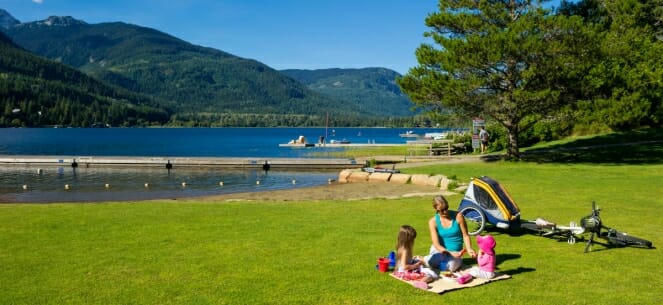
Water quality is monitored at Whistler’s major beaches in the summer from Victoria Day in May to Labour Day in September.
Monitoring
The water quality is typically very good. RMOW staff collect weekly samples from Lakeside, Wayside, Alpha Lake, Rainbow, and Lost Lake parks, which are analyzed by a laboratory affiliated with Vancouver Coastal Health.
Tests check that fecal coliform concentrations meet the Canadian Recreation Water Quality Guidelines. Fecal coliform is bacteria found in warm-blooded animals that can enter lakes from household pets or farm animals, wildlife, stormwater runoff, untreated wastewater effluent, sewage overflows or failing septic systems. A high concentration of fecal coliform may indicate the presence of other harmful bacteria in the water.
If a swimming beach were to show elevated concentrations of fecal coliform, the swimming area would be closed.
View the latest Beach Water Quality Results
Swimmer’s Itch
Swimmer’s itch naturally occurs throughout North America and is a temporary, itchy rash caused by microscopic parasites passed between water fowl and certain snails.
A larval parasite, called a cercaria, is released by snails and can mistakenly penetrate a person’s skin rather than its rightful host, usually a duck. Swimmer’s itch occurs in both freshwater and marine coastal environments and is not related to the quality of the water.
While there is no formal monitoring program for swimmer’s itch at Whistler’s beaches, if the RMOW receives a report from a community member or the Whistler Health Care Centre, signs are posted at the swimming beach with information about how to reduce the risk. Swimmer’s itch has been reported by community members on occasion this summer after swimming at Alta and Alpha Lakes.
Learn more about swimmer’s itch by reading an overview from HealthLink BC.
Minimize your chance of getting swimmer’s itch:
- Wear waterproof sunscreen, which may act as a protective film on your skin, and apply often.
- Avoid areas with lots of weed growth. There tend to be more larvae near shore, so swimming off a dock may help.
- Towel off vigorously or shower immediately after leaving the water, although this will not remove larvae that have already entered the skin. For your convenience, the RMOW has installed outdoor showers at Lost Lake, Alpha Lake, Wayside, Lakeside and Rainbow parks.
Contact
Environmental Stewardship
stewardship@whistler.ca
